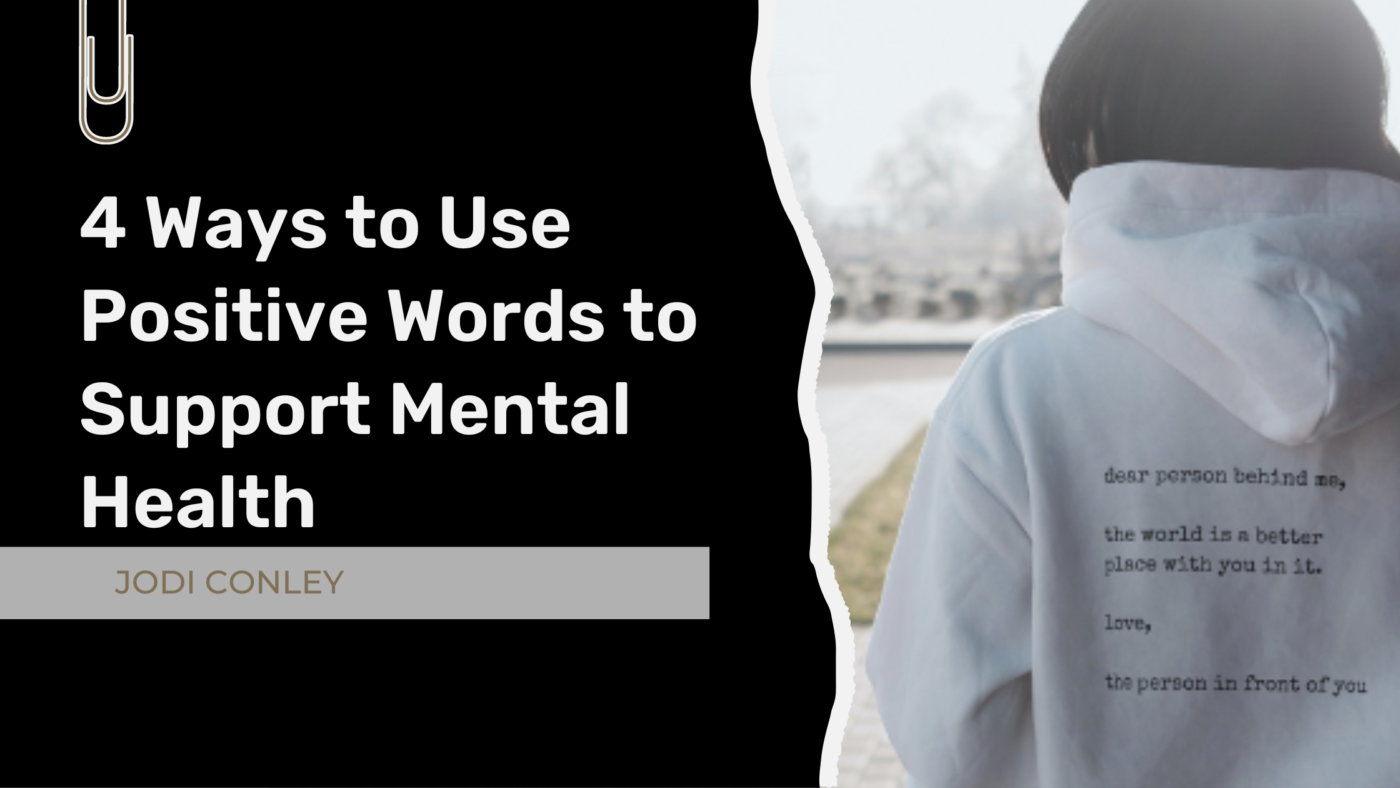Words Can Support Mental Health
We’ve all heard the saying, “Sticks and stones may break my bones, but words will never hurt me!” But the truth is the words we use and hear can and do hurt and can support mental health. According to researchers, words may pack a harder punch than we realize. Psychologists Zhansheng Chen and Kipling D. Williams of Purdue University, Julie Fitness of Macquarie University, and Nicola C. Newton of the University of New South Wales found that the pain of physical events may fade with time, while the pain of social occurrences can be re-instantiated through memory retrievals. (Sticks and Stones: A New Study on Physical and Psychological Pain)
Furthermore, negative self-talk has been linked to increased anxiety and depression. Scientifically speaking, negative words whether heard, expressed, or written, have the power to not only generate anxiety, but also sustain it long-term. So, the real question is, do positive words have the opposite effect on mental health? How can we use positive words to support mental health?
The Power in Positive Word Choice on Mental Health
1. Paying compliments to others
Have you ever been paid a compliment by a total stranger? Have you ever paid a compliment to a stranger? Research has found that giving compliments not only makes the person receiving them feel better, but it increases serotonin, productivity, and immune system function in those giving the compliment.
2. Aim for positivity with self-talk.
We all have that inner monologue that runs throughout the day. The voice can be positive, negative, or neutral. It is indeed true that we are often our own worst critics, and being mindful of this is important. People with depression and anxiety frequently experience overly negative self-talk; the internal dialogue they hear may be incessant and overly critical. Overwhelmed by the negativity, they can sit in painful rumination, attacking themselves endlessly. Conversely, those with positive self-talk can experience increased productivity, resilience, and confidence.
But how do you change from negative self-talk to words that support mental health?
One way to lessen negative self-talk is to shift focus away from yourself and toward others, or the world in general. Research shows, those focused on others are more likely to ignore or turn off the self-criticism and become more patient, self-compassionate, and open to self-improvement and seeking outside help without fear of inadequacy.
3. Use positive affirmations.
This goes along with positive self-talk, and is a way to refocus negative thoughts when they creep in. Positive affirmations are a form of self-help. Practicing daily positive affirmations can help you overcome fear and self-doubt and reduce self-sabotage. There has been plenty of research that’s shown positive affirmations decrease stress, increase well-being, and increase self-worth by reflecting on your core values.
4. Let others know they matter and express your gratitude for them.
Those who feel they do not matter to anyone are more likely to suffer from anxiety, depression, and burnout. It’s easy to get caught up in the chaos of life, but it’s important to let those in our lives know they matter. We never know what battles another is fighting, and with that, we also do not know the depth of their loneliness or sadness. Most people would not want anyone to feel alone or uncared for, but many do suffer from feeling these inadequacies.
Additionally, expressing gratitude is one way to increase your own mental health as well.
Expressing gratitude can improve your mood. Those who regularly express gratitude for the things in their life are happier with lower rates of depression and anxiety.
Showing gratitude can make you more optimistic. Studies show that those who express gratitude often have a more positive outlook in general.
Sharing gratitude can improve social bonds. Many have reported feeling more loved and more connected to the people in their lives when they regularly practice gratitude or those around them practice gratitude.
Practicing gratitude can improve your physical health. People who actively express gratitude tend to be more engaged in activities to take care of their physical health, like eating well and exercising.
The Bottom Line About Positive Words
Words hold massive power and impact, and we need to be mindful before we speak, both to others and ourselves. If you notice something positive about someone, regardless of how small, share that compliment! You will never hear someone complain about you complimenting them, and your kind words can create a lasting impact. Be mindful of your self-talk. When you say something aloud enough times your words become the truth not only in your own mind but in the minds of everyone you are saying them too. Make that effect a positive one! And finally, express gratitude and affirmations however you can, whether that is speaking it, writing it, or wearing it.

